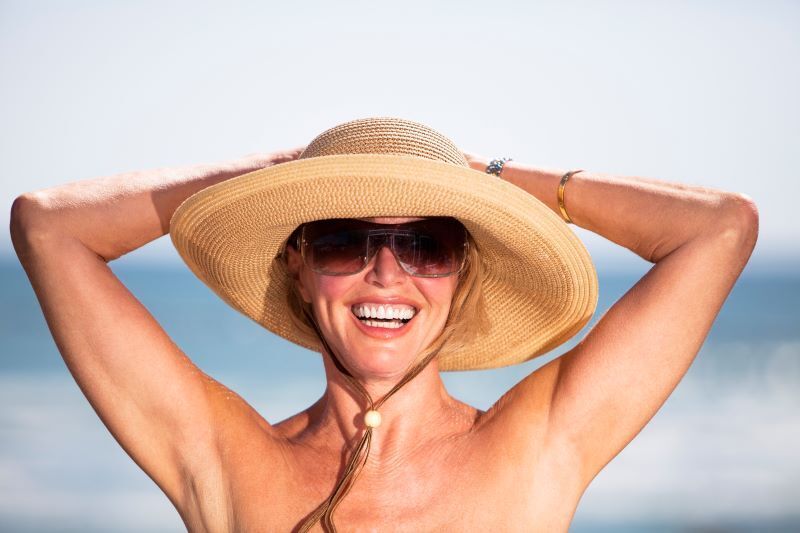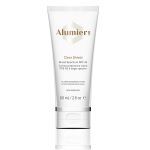Sunscreens: your questions answered
By Dr Martina Pirklova
Dip Imp Dent RCS (Eng). Level 7 Certificate in Injectable Aesthetic Non-Surgical Interventions

It's so lovely to see the sun after what feels like a VERY long winter. There's nothing quite like the feeling of the warm sun on your skin. I'm totally a summer person. In another life, I probably would've been a cat, spending my days lounging by a sunny window!
Whilst I will be one of the first digging out my summer wardrobe I am duty-bound to reiterate the annual warning about the damage sun can do to our skin. The British Association of Dermatologists (BAD) says more than 100,000 new cases of skin cancer are diagnosed annually in the UK, and while the disease can occur on parts of the body not exposed to sunlight, extensive sun exposure is thought to be responsible for the vast majority.
As many as 80% of cases of skin cancer are preventable, the BAD says, which means we really need to be reaching for the sunscreen on a more regular basis. But what factor should we be wearing? How much do we need to apply? And is it still really necessary even when it’s raining?
Our friends at AlumierMD, have pulled together a list of the most common questions and answers around suncreen, giving you all the valuable information you need to enjoy the sun safely.
Why should I use sunscreen?
It is well known that the sun’s ultraviolet (UV) radiation causes skin cancer and premature skin aging. A 2011 study from Australia reported that daily sunscreen use reduces melanoma risk by 50% and reduces the risk of squamous cell carcinoma by 39%. Therefore, the importance of sun protection is indisputable.
Green AC, Williams GM, Logan V, Strutton GM. Reduced Melanoma After Regular Sunscreen Use: Randomized Trial Follow-Up. Journal of Clinical Oncology. January 20, 2011 2011;29(3):257-263.
How does sunscreen work?
Sunscreens contain chemical or physical UV filters. Chemical filters like avobenzone and octinoxate absorb and deactivate UV rays changing the light energy to heat. Physical filters like zinc oxide and titanium dioxide sit on the skin’s surface. Light is largely reflected and scattered away from the skin.
What does SPF mean?
The SPF value indicates the level of sunburn protection provided by the sunscreen. All sunscreens must be tested by an SPF test procedure. The test measures the amount of UV ray exposure it takes to cause sunburn when a person is using a sunscreen in comparison to how much UV exposure it takes to cause a sunburn when they do not use a sunscreen. The product is then labeled with a certain SPF value indicating the amount of sunburn protection provided by the product. Higher SPF values (up to 50+) provide greater sunburn protection than lower values. Since SPF values are determined by a test that measures protection against sunburn caused by UVB rays, SPF values only describe a sunscreen’s UVB protection, not UVA (U.S Food and Drug Administration).
What does broad-spectrum mean?
Sunscreens that offer protection from both UVA and UVB rays are labeled as broad-spectrum.
What SPF value should I look for in a sunscreen?
Only broad-spectrum sunscreens with an SPF of 15 or higher can claim to reduce the risk of skin cancer and early skin aging if used as directed with other sun protection measures. Any sunscreen not labeled as broad-spectrum and those with an SPF between 2 and 14 can only claim to prevent sunburn (U.S Food and Drug Administration).
At AlumierMD, we recommend using an SPF of 30 or higher. An SPF of 30 blocks 96.7% of UV rays so that only 3.3% will get through, compared with an SPF of 15 which blocks 93.3% of UV rays and lets through 6.7% – twice as much.
Why is zinc oxide used in all AlumierMD sunscreens?
Zinc oxide is a safe, gentle and natural mineral that blocks both UVB (burning) rays and UVA rays that are associated with photoaging and skin cancer. Also, since zinc oxide just sits on the skin to provide sun protection, it is comfortable and non-irritating.
What are the concerns with most chemical sunscreen filters?
Most chemical sunscreen filters are made up of small particles that are absorbed into the skin. Examples include oxybenzone, octinoxate, homosalate, octisalate and octocrylene. By contrast, physical sunscreen ingredients like zinc oxide and titanium dioxide contain large particles that sit on the skin.
Dozens of studies in the last decade have examined the potential health hazards of small molecule sunscreen chemicals, including skin irritation or allergy, hormone disruption and skin damage that occurs when sunlight interacts with sunscreen chemicals (EWG 2015). Many sunscreen chemicals are known or suspected hormone disruptors, allergens and carcinogens.
The worst offender is oxybenzone, which is part of the benzophenone family. EWG gives oxybenzone a high hazard rating of 8/10. It penetrates the skin and has been found in mother’s milk. Oxybenzone has been associated with skin allergies and is known to be a hormone disruptor. A study by the National Institute of Health (NIH) and the New York State Department of Health’s Wadsworth Centre found that men with high exposure to benzophenone UV filters had a 30% reduction in fertility (published in the American Journal of Epidemiology, 2014).
The U.S. Centres for Disease Control (CDC) detected oxybenzone in more than 97% of Americans based on a sample of more than 2500 adults and children (Calafat 2008). Even though oxybenzone has been linked to skin allergies, hormone disruption and cell damage, 80% of chemical sunscreens sold in the U.S. and Canada contain oxybenzone.
Health Canada, the FDA and several medical associations maintain that these chemical filters are safe only because there are no randomized clinical trials proving otherwise, not because they have actually been proven to be safe. We should be proactive and avoid these filters. There will never be double-blinded randomized clinical trials regarding the above because they would be unethical.
**AlumierMD’s sunscreens do not contain small-molecule chemical filters.
REclinic recommends...

We love the Clear Shield Broad Spectrum SPF 42 from AlumierMD. It's a lightweight, non-comedogenic, quick-drying physical sunscreen that provides powerful broad-spectrum protection against harmful UVA and UVB rays using a combination of zinc oxide and titanium dioxide. Niacinamide soothes and relieves redness and sodium hyaluronate hydrates.
Simply apply generously and evenly to face, neck and chest 15 minutes before sun exposure and then reapply as required, particularly after swimming, washing, towel drying or heavy perspiring.
Skincare in our Bicester clinic
At Reclinic we are proud to be an approved stockist of AlumierMD medical skincare range combining a variety of medical-grade ingredients, including AHAs, BHAs, retinol, antioxidants, vitamins and peptides.
AlumierMD was born out of an undertanding that everyone wants clear beautiful skin. Their products use the highest grade of ingredients at the correct percentages proved by clinical studies. We want to bring you the most effective formulations using optimal medical grade ingredients. A combination of the right skincare with our understanding of the physiology behind skin types and conditions will help you to achieve a great skin and youthful glow.
We seamlessly integrate professional treatments with skincare at home. Why not book a FREE consultation and start your journey to beautiful skincare at home and with the expertise of REclinic and AlumierMD? https://www.reclinic.co.uk/tre...
Follow us on social media to see before and afters, patient journeys, informative stories, and to find out more about the other treatments we offer.